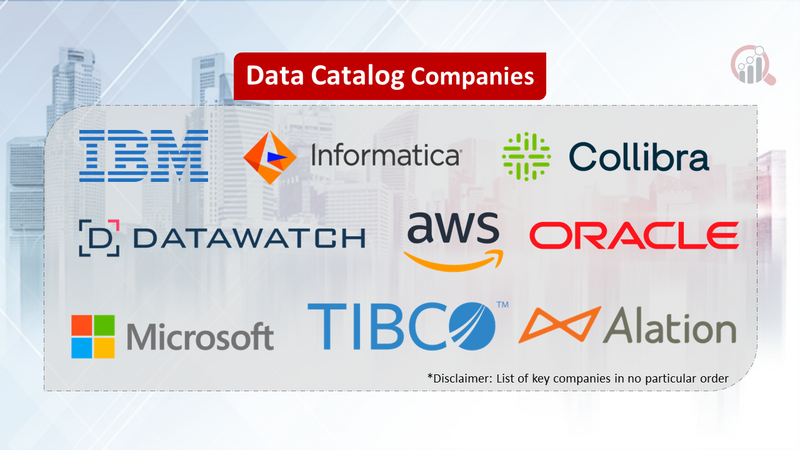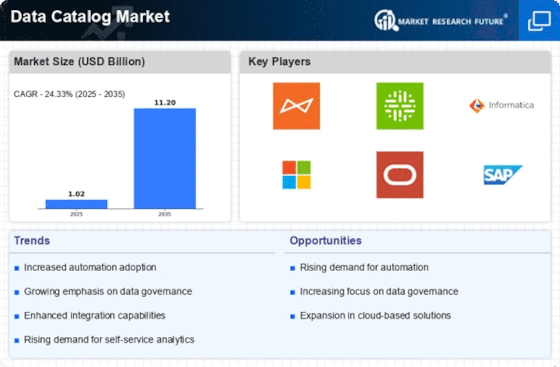Top Industry Leaders in the Data Catalog Market

Competitive Landscape of the Data Catalog Market:
The data catalog market is experiencing explosive growth, driven by the ever-increasing volume and complexity of organizational data. This vast information ocean presents a challenge, and data catalogs offer a lifebuoy, helping businesses discover, understand, and govern their data assets effectively. As the market heats up, understanding the competitive landscape becomes crucial for both established players and emerging challengers.
Key Players:
- IBM
- Informatica
- Amazon Web Services
- Collibra
- Oracle
- Alation
- Microsoft
- TIBCO Software
- Datawatch Corporation
- Alteryx
- Zaloni
- Tamr
Strategies Adopted:
- Product Differentiation:Players are going beyond basic data discovery to offer advanced features like data lineage tracking, data quality monitoring, and AI-powered insights. Collibra's focus on data governance and Alation's emphasis on data collaboration are prime examples.
- Deployment Flexibility:Cloud-based solutions are dominating, with players like Microsoft Azure Purview and AWS Glue Catalog catering to the increasing adoption of cloud platforms. On-premises and hybrid options remain relevant for specific needs.
- Partnerships and Integrations:Collaborations with data management vendors, cloud providers, and analytics platforms expand reach and offer comprehensive data ecosystems. Microsoft's partnership with Snowflake and Alation's integration with Tableau are noteworthy examples.
Market Share Analysis:
- Revenue Share:Established players currently hold the lion's share, but their dominance is being challenged by the agility of emerging players. Market research firms like Mordor Intelligence and Fact.MR offer valuable insights into market size and growth projections.
- Customer Segment Share:Large enterprises with complex data environments remain a key target, but smaller businesses are increasingly adopting data catalogs. Understanding the specific needs of each segment is crucial for tailoring offerings and pricing strategies.
- Regional Share:North America and Europe currently dominate the market, but Asia Pacific is expected to see the fastest growth due to rapid digitalization. Players must adapt their strategies to cater to regional nuances.
New and Emerging Companies:
- Castor:This startup focuses on building a user-friendly data catalog for business users, simplifying data discovery and governance.
- Unifi:Leveraging AI and machine learning, Unifi automates data cataloging and lineage mapping, reducing manual effort and improving data accuracy.
- Varada:This cloud-native platform emphasizes data governance and compliance, catering to organizations with strict regulatory requirements.
- Zalando Data Catalog:Developed by the e-commerce giant, Zalando's open-source offering provides a flexible and scalable solution for data-driven organizations.
Current Company Investment Trends:
- R&D:Players are investing heavily in AI and machine learning to automate data cataloging processes and improve data insights.
- Acquisitions and Partnerships:Consolidation is on the rise, with established players acquiring startups to fill technology gaps and expand market reach.
- Cloud Focus:Investments are shifting towards cloud-native solutions to cater to the growing adoption of cloud platforms.
- Open-Source Initiatives:Some players, like Zalando, are embracing open-source technologies to attract developer communities and foster innovation.
Latest Company Updates:
October 2023, Informatica acquired data governance platform Akur8 in October 2023 to strengthen its data catalog offerings.
October 2023, Alation released its updated Data Governance Suite in October 2023, featuring enhanced data lineage tracking and security features.
July 2023, RightData launched a new data catalog solution called DataMarket in July 2023. It promises a user-friendly interface for managing data assets and facilitating data analysis.










